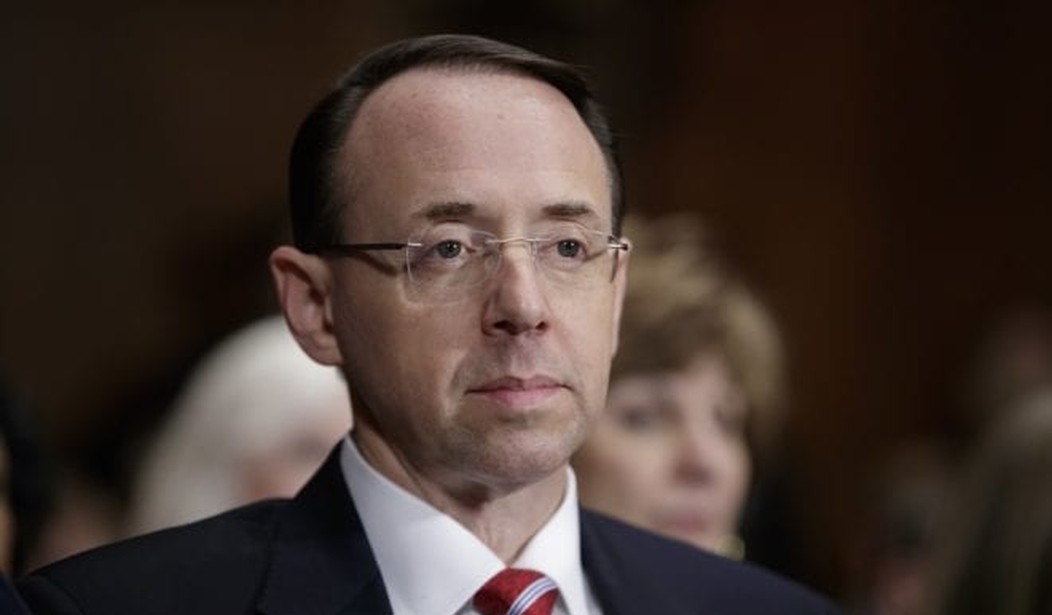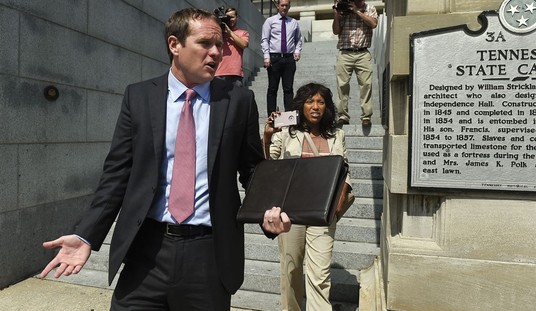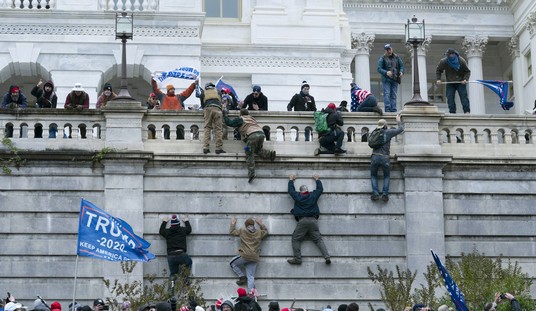
Deputy Attorney General-designate, federal prosecutor Rod Rosenstein, listens on Capitol Hill in Washington, Tuesday, March 7, 2017, during his confirmation hearing before the Senate Judiciary Committee. (AP Photo/J. Scott Applewhite)
The Washington Examiner’s Byron York reported the existence of a third scope memo, signed by then-Deputy Attorney General Rod Rosenstein on October 20, 2017.
The first memo, the letter which appointed Robert Mueller to the Special Counsel and outlined his mission in general terms was released to the public and can be viewed here. Mueller was authorized to investigate the following:
i) any links and/or coordination between the Russian government and individuals associated with the campaign of President Donald Trump; ii) any matters that arose or may arise directly from the investigation; [and] iii) any other matters within the scope of [obstruction of justice laws].
The second scope memo was released in heavily redacted form during the Paul Manafort trial in April 2018 and can be viewed here. The redacted version authorized Mueller “to investigate Russian interference with the 2016 presidential election and related matters.”
In addition to addressing allegations against Paul Manafort, the second scope memo authorizes the Special Counsel to investigate “four sets of allegations” against former national security adviser Michael Flynn. “It also granted Mueller approval to investigate whether Papadopoulos, another Trump aide, was working as an agent for Israel.”
Rep. Devin Nunes (R-CA) recently saw an unredacted copy of this document. Although he couldn’t disclose any details, he said, “I was finally able to see the scope memo and remember, I had these concerns that it was based upon the Steele dossier and look, I can’t talk about what’s in there, but we know from what Judge Sullivan put out. We know that it was probably largely based on the Steele dossier.”
Byron York writes that the DOJ recently provided access to several members of Congress to a third scope memo, written by Rosenstein and dated October 20, 2017. According to York:
At the moment, the third scope memo, like most of the second scope memo, remains a secret. Mueller included a brief description of it in his report, revealing that Rosenstein reauthorized him to investigate Michael Cohen, Richard Gates, and Roger Stone “as part of a full and thorough investigation of the Russian government’s efforts to interfere in the 2016 presidential election.” But the report, as released, blacked out other names on the grounds of “personal privacy.” It is not clear what parts of the investigation they represented, and it is not clear why a third scope memo was necessary in the first place.
Most of all, it is not clear whether all that secrecy is warranted. Perhaps the memos concern matters that are still ongoing that need to remain under wraps. On the other hand, Mueller announced that his investigation into conspiracy and coordination between Russia and the Trump campaign — the core area of his jurisdiction — was over and done. “The office has concluded its investigation into links and coordination between the Russian government and individuals associated with the Trump campaign,” the Mueller report said.
Will other scope memos emerge? What, if any, evidence did Rosenstein require from Mueller to expand the scope? Was there ever a Mueller request that Rosenstein said no to?
It was Rosenstein’s role to supervise the activities of the Special Counsel, and his apparent submission to Mueller suggests that Mueller was actually driving the bus.
Former FBI lawyer Lisa Page testified last summer that, at the time Rosenstein appointed Mueller to the Special Counsel in May 2017, the FBI had found no evidence that Trump had colluded with the Russians to win the presidency. The ten-month FBI counterintelligence investigation of the Trump campaign had been unable to find evidence of collusion.
Why then did Rod Rosenstein find it necessary to appoint a Special Counsel at all? Is it possible he did it for personal reasons? Democrats were furious when they heard of Rosenstein’s role in Comey’s firing. Even the NY Times reported that a “shaken” Rosenstein felt used by the White House in the wake of the Comey firing. Did he appoint the Special Counsel to redeem himself?
Why, of all people, did he choose the highly conflicted Robert Mueller? There were three valid reasons why Mueller was a poor choice:
According to Special Counsel regulations, the Special Counsel shall be selected from outside the United States Government. Robert Mueller spent his entire life in U.S. government. He was the quintessential Washington insider.
He had interviewed with President Trump to return to his old position as FBI Director and was rejected the day before Rosenstein appointed him.
There was bad blood between Mueller and Trump stemming from a years earlier dispute over a refund for a club membership.
I wrote a post entitled, “Rod Rosenstein Has Major Conflicts Of Interest In Trump Collusion Case – Signature On FISA App Only The Latest,” in which I detailed the reasons why he should have recused himself from this case. For starters, he had signed off on the last FISA Court application for a Carter Page surveillance warrant. Throughout the 2018 Congressional investigations, Rosenstein stalled and/or refused to provide DOJ/FBI documents the committees had requested. At one point, House Republicans filed articles of impeachment against him. When questioned about this development, Rosenstein said “The DOJ won’t be extorted by Congress.” It sure appeared as if he were protecting someone. And, there were other very compelling reasons.
1. In May 2017, Rosenstein wrote the memo outlining the case for firing FBI Director James Comey. Wouldn’t his role in writing the memo make him a potential witness in the obstruction case against Trump?
2. Rush Limbaugh reminds us that Rod Rosenstein was on the prosecution team that fully exonerated Hillary Clinton in the Whitewater scandal (and both Clintons in the Travelgate and Filegate scandals). Shortly after Rod Rosenstein cleared Hillary, his wife, Lisa Barsoomian, represented Bill Clinton in a 1998-99 civil case in federal court.
3. Limbaugh also points out that Rosenstein gave Mueller “free reign” in his investigation of Trump, which is not allowed under DOJ regulations. “DOJ regulations require that a crime be named and that is what the special counsel shall pursue and, if during said investigation, the special counsel encounters something else that is not within the purview of the crime being investigated, he’s got to go back to the person who appointed him and seek permission to add this newly discovered crime to the investigation. None of that has happened.”
4. Rosenstein signed off on the raid of Trump’s personal attorney Michael Cohen’s office, home and hotel room in April, an incident which infuriated the President. Some believe this raid, particularly the manner in which it was carried out, was a calculated move intended to provoke Trump into firing Mueller.
The former DAG has major conflicts of interest and should have recused himself from the beginning.
Rosenstein is the keeper of the secrets who knows where all the bodies are buried. He knows this because he was in on it.












Join the conversation as a VIP Member